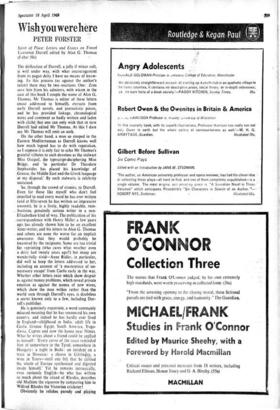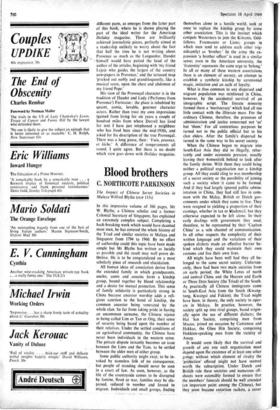Wish you were here
PETER FORSTER
Spirit of Place: Letters and Essays on Travel Lawrence Durrell edited by Alan G. Thomas (Faber 50s)
The deification of Durrell, a jolly if minor cult, is well under way, with what encouragement from its pagan deity I have no means of know- ing. To this process (as against the author's talent) there may be two reactions. One-. Zeus save him from his admirers, with whom in the case of this book I couple the name of :Alan G. Thomas. Mr Thomas is editor of these letters (most addressed to himself), extracts from early Durrell novels, and journalistic pieces, and be has provided linkage, chronological notes and comment so badly written and laden with cliché that one can only wish that in turn Durrell had edited Mr Thomas. At this tdare say Mr Thomas will emit an oath.
On the other hand, a man so steeped in the Eastern Mediterranean. as Durrell knows well -how much legend has to do with reputation, so I suppose it is only fair to echo Mr:Thornas's grateful tributes to such devotees as the- stalwart Miss Ossipof, the typescript-deciphering. Miss Briggs. and `in particular Dr Theodore .Stephanides has placed his knowledge of Greece, the Middle East and the Greek -language at my disposal.' By such stalwarts is celebrity sustained.
So, through the crowd of cronies, to Durrell. Even for those like myself who don't feel -impelled to read every word he has ever written
• (and at fifty-seven he has written an impressive amount), he is a lively, highly readable, rum-
, bustious, .genuinely serious .writer in a neo- ,Elizabethan kind of way. The publication of his :correspondence with Henry Miller a few years ago,.has already shown him ,to be an excellent letter-writer,. and his letters to Alan G. Thomas and others are- none the worse for, an implicit awareness that they, would probably be treastfredhy the recipients. Some are to trivial for reprinting (who cares what weather even a deity had twenty years ago?) but many are wonderfully vivid—Anne Ridler, in particular, did well to keep the letters addressed to her, including an account of 'a masterpiece of un- necessary escape' from Corfu early. in the war. Whether other letters exist which show despair as against money problems, which reveal private emotion as against the names of new wives, which show the man within rather than the world seen through Durrell's eyes, is doubtless a secret known only to a few, including Dur- rell's publisher.
He is genuinely expatriate, a word commonly misused meaning that he has renounced his own country, and indeed he has hardly ever lived in England—childhood in India.- adult life in Corfu. Greece, Egypt, South America, Yugo- slavia, Cyprus and now the house near Nimes. What he writes about a friend could be applied to himself: ;Every curve of the coast reminded him of somewhere in the Tyrol, somewhere in Hungary : a night in Buda: an incident on a train in Slovenia: a cheese in GEittinge9, a wine in Tours—until one felt that he carried the whole of Europe synthesised and digested inside himself.' Yet he remains intrinsically, even curiously English—he who has written so much about the island of Rhodes, describes old Mathieu the vigneron by comparing him to Wilfred Rhodes the Victorian cricketer!
' Obviously he relishes parody and playing different parts, as emerges from the latter part of this boa, where he is shown playing the part of the ideal writer for the American Holiday magazine. These are brilliantly achieved journalistic pieces, perfectly aimed at a readership unlikely to worry about the fact that half the time he is not writing about Provence so much as the Languedoc. Daudet -- himself would have patted the head of the author of the articles, beginning with `my friend Lejoie who guides the largest of the country newspapers in Provence,' and the tattooed map 'pricked out nobly, and grandiloquently, like a musical score, upon the chest and abdomen of my friend Pepe.'
His view of the Provencal character is in the tradition of Daudet and Lady ('Perfumes from Provence') Fortescue: the place is inhabited by quaint, comic, lovable, gourmet character actors. Rather than trust my own impressions (gained from living for six years a couple of hundred miles from where Durrell has lived for ten) I have just telephoned a neighbour who has lived here since the mid-1930s, and asked for his description of the true Provençal. There was a long pause, then: 'Vain, peureux, et hiche.' A difference of temperaments all round, I quite agree. But there is no doubt which view goes down with Holiday magazine.











































 Previous page
Previous page